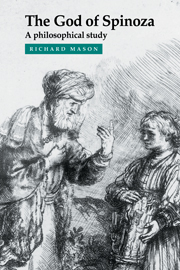Introduction: Spinoza's many contexts
Published online by Cambridge University Press: 06 January 2010
Summary
Baruch or Bento Despinoza was born in Amsterdam on 11 Kislev 5393. Benedictus de Spinoza died forty-four years later at the Hague on 21 February 1677.
A few other clear facts are known about his life. He was born into the Portuguese-Jewish community of Amsterdam. His father was a merchant. His mother died while he was a child. His upbringing, it is believed, was conventionally Jewish.
By 1656, when he was 23, he had already become an anomaly. He was expelled from his synagogue for reasons which remain uncertain, despite much scholarly labour and conjecture. From then onwards he was never a member or adherent of any religious group or community. He used a non-Jewish version of his name. For the rest of his life he studied and wrote, living partly from lens-grinding, and also from the generosity of his friends.
During his lifetime he published, in 1663, a volume on the work of Descartes and, in 1670, anonymously and under a disguised publisher's name, the Theological-Political Treatise. Soon after his death his friends brought to publication his posthumous works, including the Ethics, presumed to be the perfected expression of his thinking. There were also a number of minor early works and a body of correspondence with many of the leading scholars in Northern Europe.
The outward simplicity of Spinoza's biography, and the bareness of our factual knowledge about him, is greatly misleading. In fact, one of the many problems that surround the interpretation of his work lies in the richness and multiplicity of its contexts.
- Type
- Chapter
- Information
- The God of SpinozaA Philosophical Study, pp. 1 - 18Publisher: Cambridge University PressPrint publication year: 1997



